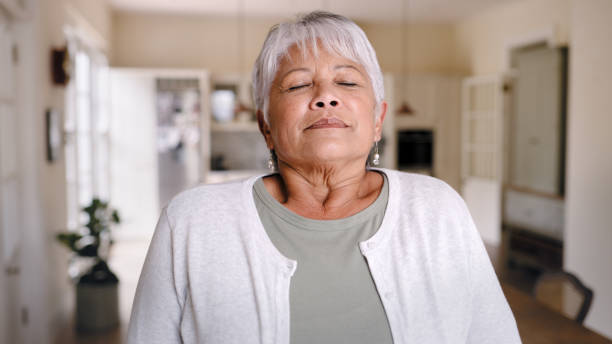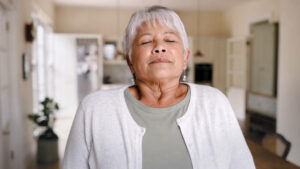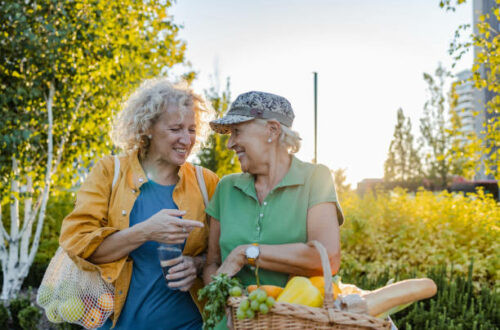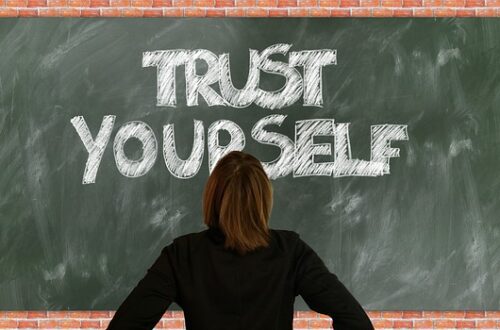
22 Ways You Can Use Mindfulness to Have Better Health Today, Tomorrow, and Into Your Future
Not long ago, I met a woman named Bea.
Bea felt so negatively about her home situation and caring for her ill husband of 44 years that she admitted to despising her husband and being tempted to leave him to fend for himself.
Thankfully, she never went through with it and decided to stay.
But what was happening to Bea’s health and well-being in the meantime?
Bea felt shattered and hopeless.
Because Bea had prolonged feelings of helplessness, she was losing her self-confidence and feeling stressed.
Bea also experienced headaches, stomachaches, and anxiousness.
Bea felt sure she was approaching burnout as she had little energy and difficulty completing simple, everyday tasks.
What could Bea do short of consulting a mental health professional?
Perhaps You Can Identify with Bea
Are you a woman aged 55+?
Are you a family caregiver?
Are you a counselor/advisor?
Are you a mentor/coach?
Do you minister to others?
Do you interact with other people in any capacity?
If so, mindfulness can do a lot for you—mentally and physically.
What Is Mindfulness?
The most popular definition: “Mindfulness means paying attention in a particular way, on purpose in the present moment, and nonjudgmentally.”—Jon Kabat-Zinn
In other words, you make an effort to live in the here and now with an attitude of nonjudgmental acceptance no matter your environment.
Mindfulness is a type of meditation that originated about 2500 years ago from ancient eastern and Buddhist philosophy.
Jon Kabat-Zinn introduced mindfulness into our western culture around 40 years ago and is now part of our culture.
But mindfulness is not some woo-woo or “new-age” exercise but is discussed widely in health/social, psychology, business, education, and most of our society.
According to the Harvard Business Review, “Mindfulness should no longer be considered a ‘nice to have’ for executives. It’s a ‘must’ have: a way to keep our brains healthy, to support self-regulation and effective decision-making capabilities, and to protect ourselves from toxic stress.”
There are many potential physical and mental health benefits of mindfulness, which I will share later in this article.
What Is Meditation?
Many people use mindfulness and meditation to mean the same thing.
Though interrelated, mindfulness and meditation are not the same thing.
Meditation is “to focus one’s mind for a time for spiritual purposes or relaxation.” (Oxford English Dictionary)
Meditation is an intentional practice during a specific time.
For example, I meditate every morning before I start my day.
Meditation is part of my morning ritual.
Mindfulness, though, “describes a specific way of living that can be cultivated through practice.”
(Source: positivepsychology.com)
In mindfulness, you pay attention to everything: thoughts, feelings, and behaviors.
You can, and should, implement mindfulness (awareness) at all times, but it takes practice.
Most of us go about our daily lives with our minds wandering all over the place at any given time instead of letting our minds stay in the present moment and being aware, noticing, and paying attention to whatever we’re doing.
Mindfulness means you are using all of your senses in the present moment, whether in a conversation with a friend or completing a task.
Summary: while mindfulness and meditation can reinforce each other, they are two different things.
Mainly, mindfulness benefit women aged 55+ regarding their overall health and well-being.
Why?
Common Health Issues of Women Aged 55+
There are many health-related issues common to older women that play havoc on their overall well-being:
- High blood pressure
- Elevated cholesterol
- Type-2 diabetes
- Depression/anxiety
- Weaker bones
- Osteoporosis
- Weight gain
- Loneliness
- Sleeplessness
- Loss of a sense of purpose
Added to the issues above, many mature women are still in the workplace and must deal with related pressures.
And we must not forget that traditionally, women are the family caregivers (as Bea mentioned above) when a loved one requires 24/7 care.
No question, senior women, in particular, can find themselves overwhelmed, discouraged, frightened, and completely burned out.
Women aged 55+ face many trials and tribulations that rob them of joy and peace.
Thus, older women need help.
In this article, I will share 22 ways to use mindfulness, a specific way of living, to have better health today, tomorrow, and into your future.
And as I list these skills (which are not hard), I will include “22 mindfulness quotes” that can help remind you how to be more mindful in your everyday life.
#1
Have a beginner’s mind.
First and foremost, recognize and be open to the many possibilities available when practicing mindfulness. Be curious and eager to learn mindfulness’s pillars (core elements) but without expectations about what could and should happen.
“A mind that opens to a new idea never returns to its original size.”—Albert Einstein
#2
Live in the moment.
Do you notice your mind wandering when you leave your home in the morning? If so, stop and pay attention to the blue sky, notice flowers along the sidewalk, and work on cultivating awareness. Focus on the sensation of your legs moving. Pay attention. What do you see, smell, or hear?
“Realize deeply that the present moment is all you have.”—Eckhart Tolle
#3
Accept your feelings.
Did you have a negative experience at work? Try to look at the events nonjudgmentally, as ruminating (worrying about and analyzing) on a minor annoyance increases the likelihood of becoming depressed. Withhold judgment on your emotional state.
“Let go of the battle. Breathe quietly and let it be. Let your body relax, and heart soften.”—Jack Kornfield
#4
Build stronger relationships.
Do you focus on another’s flaws? Are you trying to change your partner in some way? Mindfulness makes it easier to accept that those around you are not perfect nonjudgmentally.
“Do not let the behavior of others destroy your inner peace.”—Dalai Lama
#5
Improve your memory.
Memory tests indicated that participants in a 2019 mindfulness training or who took a creative writing course showed reductions in proactive interference, which resulted in improvements in their short-term memory.
(Source: APA PsycArticles)
“The best way to take care of the future is to take care of the present moment.”—Thich Nhat Hanh
#6
Stay Grounded.
Merriam-Webster’s definition: “Mentally and emotionally stable: admirably sensible, realistic and unpretentious. Remains grounded despite praise and attention.” Non-striving is one of the major pillars of mindfulness.
“Breathe and let be.”—Jon Kabat Zinn
#7
Slow down.
Do you tend to respond to situations on auto-pilot? Slow down. Stop and pay close attention at all times without judgment.
“In today’s rush, we all think too much, seek too much, want too much—and forget the joy of just being.”—Eckhart Tolle
#8
Avoid multitasking.
Do one thing at a time, which can be challenging! If you’re eating dinner, do not watch TV or scroll on your phone at the same time. Only eat dinner. Focus present-moment attention on what you’re doing.
“Be where you are, not where you think you should be.”—Unknown
#9
Avoid jumping to conclusions.
Create a gap between the situation and your reaction to see the problem more clearly and make wiser choices. Nonjudging is an attitude of mindfulness.
“Your calm mind is the ultimate weapon against your challenges. So, relax.”—Bryant McGill
#10
Breathe.
Step away from the computer, shut down the Smart Phone, iPad, and other devices, and breathe. Focus your attention on the present moment. Deep breathing can calm you; this can be done anywhere. A quick breathing exercise is called the 7-11: count to seven as you breathe in; count to eleven as you breathe out. You will immediately feel relaxed.
“In a world full of doing, doing, doing, it’s important to take a moment just to breathe, just to be.”—unknown
#11
Practice generosity.
“The practice of being kind and generous.”—Oxford English Dictionary
Studies show that generosity increases our well-being and our mental health. Practicing generosity is good for you! And generosity is a significant pillar of mindfulness.
“Each morning, we are born again. What we do today is what matters most.”—Eckhart Tolle
#12
Practice gratitude.
Oxford English Dictionary: “The quality of being thankful; readiness to show appreciation for and return kindness.” Do you keep a gratitude journal? Do you have gratitude rituals, such as meditating or praying? Gratitude is a significant pillar of mindfulness.
“Mindful meditation doesn’t change a life. Life remains as fragile and unpredictable as ever. Meditation changes the heart’s capacity to accept life as it is”—Sylvia Boorstein
#13
Practice Participant Observation
Participant observation helps us see and understand what people are doing, which we can compare to what people say.
“The best way to capture moments is to pay attention. This is how we cultivate mindfulness. Mindfulness means being awake.”—Jon Kabat Zinn
#14
Show empathy.
Empathy means the ability to walk in someone else’s shoes. It means sharing their feelings, thoughts, and experiences. It means to be in that person’s situation. And without judgment. Mental health expert Dr. Rick Hanson states, “empathy is in our bones.” Studies also suggest, “The practice of mindfulness causes changes in the same brain area that are related to empathy.”
(Source: Frontiersin.org)
“Our primary purpose in life is to help others. And if you can’t help them, at least don’t hurt them.”—Dalai Lama
#15
Learn to let go.
If you’re trying to move forward from a painful experience, mindfulness requires that we bring our focus back to the present moment. Practice being present, and the hurt you feel will have less control over you. You can choose how to feel.
“Nothing is worth more than this day. You cannot relive yesterday. Tomorrow is still beyond your reach.”—Johann Wolfgang von Goethe
#16
Trust.
Be with yourself. Develop trust in yourself: “You have the power and freedom to start making new choices in the present moment. Building trust in yourself means choosing a mindful stance, especially moments of emotional vulnerability.”
(Source: mindfulnessmuse.com)
“Mindfulness is a way of befriending ourselves and our experience.”—Jon Kabat Zinn
#17
Practice patience.
“The capacity to accept, or tolerate delay, trouble without getting angry or upset.”—Oxford English Dictionary
Impatience, or a short fuse, harms our mental and physical health. On the other hand, patience is all about mindfulness and being in the present moment, accepting, without judgment. We quietly pay full attention to what is happening in our bodies, heart, and mind.
“The first and best victory is to conquer self.”—Plato
#18
Set your intentions.
Setting daily intentions is a wellness practice as it empowers you to decide what you want in life and how you want to experience life. You are the COO (Chief Operating Officer) of your life and experiences. Only you must take control of your choices. In this way, you live a life of purpose. You will not feel like a victim. Some methods to set intentions include: establishing a ritual, meditating, and writing your intentions down. (You’ll find many other processes on the web.)
“Our life is shaped by our mind, for we become what we think.”—Buddha
#19
Practice non-reactivity.
In a high-stress situation, you will allow experiences to come and go without reacting in a few minutes of mindfulness. In a case like this, mindfulness can act as a buffer or a safeguard against criticism designed to tear you down.
“She was unstoppable, not because she did not have failures and doubts, but because she continued despite them.”—Beau Taplin
#20
Practice self-regulation.
What is self-regulation?
“Control [of oneself] by oneself.”—Andrea Bell
We all experience negative emotions at one time or another. However, mindfulness leads to present-moment awareness and acceptance of the negative emotional experience. While not removing what’s causing the pain, in mindfulness, we don’t remain stuck and can bear up and recover from discomfort.
“Most people are afraid of suffering. But suffering is a kind of mud to help the lotus flower of happiness to grow.”—Thich Nhat Hanh
#21
Develop an awareness of your awareness.
Do not react to situations on auto-pilot. Mindfulness is the ability to focus on what you’re doing rather than doing things haphazardly and without thought. You want to be aware of your body, mind, and emotions. What’s going on inside of you at any given moment? You want to have an “awareness” of your awareness.
“When you replace ‘why is this happening to me?’ to ‘what is this trying to teach me?’ everything shifts.”—Unknown
#22
Choose to act the love—always.
Nonjudgmental awareness is a mindfulness skill that leads to compassion for yourself and your loved ones. Do not judge things as “good” or “bad.” Instead, choose to act the love, which means to exhibit loving-kindness.
“One word frees us of all weight and pain in life—that word is love.”—Sophocles
Health Benefits of Mindfulness
There are numerous Journal Articles on the physical and mental health benefits of mindfulness that include:
- Relieve stress, anxiety, and depression
- Treat heart disease
- Lower blood pressure,
- Reduce chronic pain
- Improve sleep
- Higher brain functioning
- Increase awareness
- Alleviate gastrointestinal difficulties
- Reduce general psychopathology
- Enhance ability to deal with illnesses
- Improve job satisfaction
- Reduce maladaptive rumination
- Increase adaptive rumination
- Mitigate adverse consequences of chronic worrying
- Experience of being calm and internally still
- Help participants lose weight and improve their eating habits
And many other benefits.
The Importance of Practice
We all have something to gain from applying mindfulness.
However, you must practice mindfulness regularly to become a specific “way of living.”
Mindfulness is being aware.
Mindfulness means noticing and paying attention to your thoughts, feelings, and everything around you.
Bea, whom I introduced at the beginning of this article, could benefit and gain overall better physical, mental, and emotional health by learning and using mindfulness’s pillars or attitudes.
Bea could learn to let go, be present, and focus on what is happening in her life at any given moment without judgment of herself or others.
It may be difficult, but Bea could also learn to trust her abilities and feel grateful even though she has a tough job as a full-time caregiver.
Lastly, Bea must choose to act the love by practicing loving-kindness not only toward her ill husband but toward herself.
So, there you have it.
22 Ways You Can Use Mindfulness to Have Better Health Today, Tomorrow, and Into Your Future.
“The mind is like water. When it’s turbulent, it’s difficult to see. When it’s calm, everything is clear.”—Prasad Mahes
If you are a woman aged 55+, begin your journey today toward learning and embracing mindfulness goals and cultivating the sense of inner peace and joy you deserve.
***** *****
Works Consulted:
A Family Caregiver’s Guide: 7 Secrets to Convert Negative Triggers to Positive Emotions (2019)
American University, Washington, D.C. Online Programs (Participant Observation)
APA PsycArticles—American Psychological Association
En.wikipedia.org
Frontiersin.org
Goodtherapy.org
Greatergood.berkeley.edu
Harvard Business Review
Journal of Neuroscience
Mindfulnessmuse.com
OxfordEnglishDictionary.com
PositivePsychology.com
Understood.org
WebMd.com




